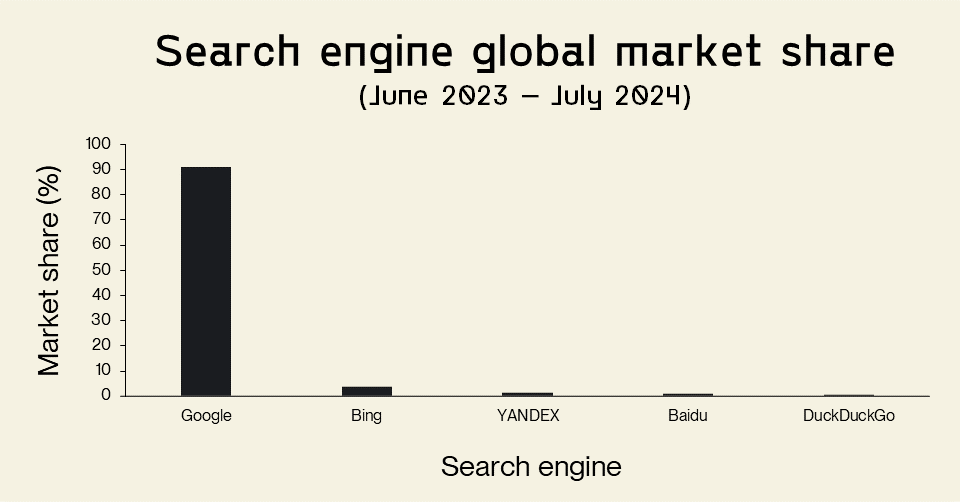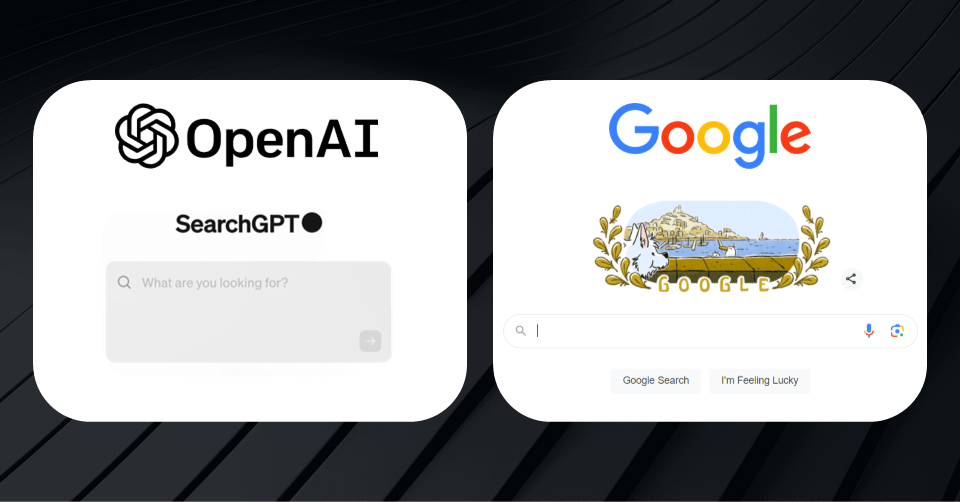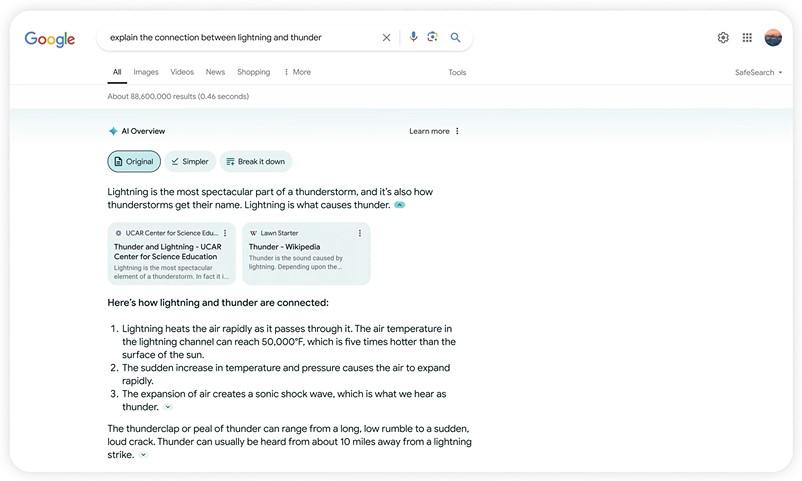On July 25th 2024, OpenAI launched a new AI tool: SearchGPT. This new AI search engine prototype, currently only available to a limited test group, is shaking up the search industry for the first time in years.
SearchGPT is a novelty that is set to revolutionise the way we search, shifting from traditional keyword-based search to conversational search. So, while Google Search offers pages of links, SearchGPT provides concise answers with clear and relevant sources. The key feature that sets SearchGPT apart from Google Search is the ability to ask follow-up questions – like a real conversation with a person. Very different to Google’s requirement of specific keywords.
For B2B marketers, this means a faster departure from keyword-focused content, and a rise towards quality and contextually relevant content.
Let’s take a closer look at OpenAI’s new search engine.
What is SearchGPT?
SearchGPT is an AI-powered search engine developed by OpenAI that uses AI to provide fast and accurate answers to user queries. Unlike traditional search engines that rely heavily on indexing and ranking web pages, SearchGPT uses natural language processing to understand and respond to questions in a conversational manner.
Dmytro Shevchenko from Aimprosoft describes using SearchGPT as having “a conversation with an intelligent assistant, making search more intuitive and convenient”.
Here are the core features of SearchGPT:
- AI-driven search – utilises advanced AI models to provide precise, contextually relevant search results.
- Natural language processing – understands and responds to user queries in a conversational manner.
- Real-time processing – integrates real-time web data for up-to-date results.
- Contextual follow-ups – allow users to ask follow-up questions, maintaining the context of the conversation.
- Direct answers – instead of just providing links to web pages, SearchGPT provides direct answers (very Chat-GPT like).
- Enhanced content discovery – helps users discover relevant publisher sites and content effectively.
- Relevant sources – answers provided have clear citations and links to the source material. Users can easily verify the information, ensuring transparency and accuracy.
Current state of search engines

Data from GlobalStats – statcounter. Image by Fifty Five and Five.
Unsurprisingly, Google dominates the search engine landscape with over 90% of the global market share, followed by Bing at 3.72% market share. World domination indeed! Over 60% of these Google searches take place on mobile, contributing to the changing consumer behaviours of non-text searches such as search using images (Google Lens), voice (virtual assistants) and location (Google Maps).
Although these traditional search engines remain the leading source of information, for younger consumers an alternative has steadily overtaken Google search. They come in the form of social media platforms.
Research shows that 46% of Gen Z prefer social media over traditional search engines. In fact, social media constitutes 44% of Gen Z’s discovery needs – brands, products, services, and experiences.
The amalgamation of these discoveries spotlights the changing consumer behaviour in terms of digital consumption and the way different demographics approach search. It’s clear that Gen Z, who have been exposed to more content than other generations, would prefer quick, direct and digestible content delivered through platforms like TikTok and YouTube, in short form video content.
SearchGPT vs Google
Until now, Google has never faced a bigger competitor than SearchGPT. Why? Because SearchGPT offers what many consumers, especially Gen Z, are looking for when it comes to search.
We established that changing behaviours mean that increasingly consumers, particularly the younger demographics, are seeking direct answers quickly, in consumable formats. They do not want irrelevant and unsatisfying results, with more scrolling and links. And that’s what SearchGPT would be solving.
The key differences between the engines are illustrated below:
|
Feature |
SearchGPT | Google Search |
|
Technology |
Advanced AI models, natural language processing. | Traditional search algorithms, indexing and ranking. |
| User interaction | Conversational, allows follow-up questions. |
Traditional query-based search. |
|
Search results |
Provides summarised answers directly with source links. | Provides pages of links to web pages. |
| Content discovery | Emphasises personalised content discovery. | Prioritises most relevant indexed pages. |
| Advertising model | Currently, there are no ads which means you’ll see the best results. |
Search results filled with ads right at the top, so the best results are not visible first. |
|
Real-time data integration |
Real-time web information. | Primarily relies on indexed data. |
| SEO focus | High-quality, contextually relevant content. |
Mostly keyword optimisation, backlinks, meta descriptions etc. |
| Source | Sources are cited directly in the response, with links to source material. |
Direct link to source in search results. |
SearchGPT’s main differentiator is the way it presents results. It analyses multiple sources on the web, then summarises them into an accurate answer, with citations. If a user needs more information, they can easily ask follow-up questions as SearchGPT maintains context across multiple interactions. This mimics a real conversation that you might have with another person, making this interaction dynamic and personalised.
SearchGPT vs AI Overviews
Google has also dipped its hand into the AI cookie jar, having launched AI Overviews earlier this year. While both are still under deployment, it’s clear that they share similarities in their features and solutions they offer their users.
Both use AI to explore web content and summarise the information into a direct answer – no links to web pages. So here, Google clearly understands users’ need for direct answers to their queries, fewer steps to get that answer. But that’s where the similarities end.
The most obvious difference is that AI Overviews is powered by Gemini (Google’s AI model) while SearchGPT is powered by GPT-4 (OpenAI’s AI model). Additionally, SearchGPT aims to provide a comprehensive answer in one go, whereas AI Overviews generally provides a summary with links to relevant web pages for further exploration, so acting as a filter and guide towards actual sources for answers.
Impact on SEO strategy
Every marketer will tell you that keywords are the pillar of an SEO strategy. Blog optimisation? Add keyword in the title, meta description and copy throughout. Google ads campaigns? Paid keywords. Now with AI crawling the web and reading every piece of content, understanding the context and giving you answers based on the information it has collected, keywords become less powerful in making your content visible.
So, SearchGPT will bring significant changes to SEO strategies. Marketers will need to focus more on creating high-quality, contextually relevant content that meets the needs of users rather than solely optimising for keywords. The conversational nature of SearchGPT means that content must be engaging and informative, answering questions directly and thoroughly. This shift may also impact keyword strategies, requiring a more nuanced understanding of user intent and query context.
What does SearchGPT mean for B2B marketing?
The advent of SearchGPT has immense implications for B2B marketing from creating content to strategy. Let’s take a look at the opportunities and challenges of SearchGPT to inform your future marketing strategies.
Opportunities and challenges
This new technology allows for more precise targeting and engagement with the target audiences by quickly providing relevant information. The conversational nature of SearchGPT enhances real-time interaction, helping users discover more relevant B2B content, thereby increasing the visibility of niche topics and specialised services.
B2B marketers can optimise their content to align with AI-driven search algorithms, improving search rankings and visibility. Utilising diverse content formats such as videos, infographics, and interactive elements that AI can effectively interpret and rank is crucial.
For B2B SMBs, SearchGPT is an opportunity to compete with bigger companies by making their content high-quality, precise and authentic, as features like brand authority and backlinks (which mostly favours bigger companies) won’t determine your visibility.
On the other hand, SearchGPT is still only a prototype so marketers need to remain vigilant on updates from OpenAI that would further impact their SEO strategies. It’s also important for marketers to develop a greater understanding of AI and its applications to fully leverage SearchGPT and improve content strategies.
Strategic recommendations
1. Embrace AI and data-driven insights
B2B marketers should invest in AI and machine learning tools to gain deeper insights into customer behaviour and preferences. Utilising AI-driven analytics will help in creating more personalised and effective marketing campaigns. Continuously update and refine these tools to stay ahead of competitors.
Explore our top 5 next-gen AI marketing tools you need this year.
2. Focus on high-quality, contextually relevant content
With SearchGPT emphasising context over keywords, it’s crucial to produce high-quality content that answers user queries comprehensively. Content should be informative, engaging, and tailored to meet the specific needs of the target audience. Regularly updating content to maintain relevance is also essential.
3. Optimise for conversational search
As SearchGPT facilitates conversational interactions, B2B marketers should optimise their content for natural language queries. This includes using conversational keywords, structuring content to answer common questions, and creating FAQ sections to address specific concerns. Adopting a user-centric approach will enhance visibility and engagement in AI-driven search results.
Incorporating these strategies into your B2B marketing means you are poised to leverage the benefits from SearchGPT, and in turn offer your target audience exactly what they are looking for. So, get ready to meet the new world of Search as AI revolutionises the way consumers discover and purchase online. The future of digital marketing sure looks different. Are you ready for it?
We can help your team get acquainted with AI
It’s difficult to integrate AI into your processes and get the team on board. We understand because we’ve done it. We’ve transformed Fifty Five and Five, our processes, tools and ways of working with AI. We can do the same for you. Get in touch today to start your AI journey to marketing success.

